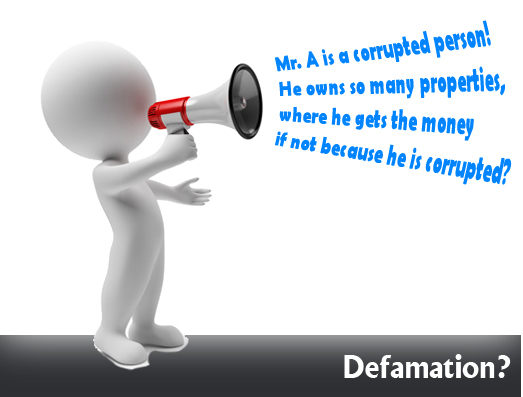 In the sector of personal injury law, defamation cases arise when a false statement injures the reputation of others. The false statement can be in the form of words, videos, photographs, or written illustrations. Since online communication has become the norm of the new generation, something malicious or untrue written about you online can also be considered as defamation.
In the sector of personal injury law, defamation cases arise when a false statement injures the reputation of others. The false statement can be in the form of words, videos, photographs, or written illustrations. Since online communication has become the norm of the new generation, something malicious or untrue written about you online can also be considered as defamation.
What the victims need to prove to show that defamation has occurred?
If you believe that you are defamed, you need to establish the following things. When it is a written statement or picture it will invariably be strong evidence than the spoken or gestured defamation. If a third party has seen or heard the statement, then the party may be a strong witness for the case. Any form of published document may also be a strong evidence for the case. The word "publish" does not mean that it has to be written in a book, it will be considered published when it appears in the television, gossip, speeches, or even in radio. It could also be written in newspaper, magazines, books, leaflets, or on picket signs.
The defamatory sentences must always be false, otherwise, it will not be considered as damaging. The opinions which cannot be proved false will not count as defamation. Say for example, when a reviewer says that this is the worst movie that I have seen so far, the movie maker cannot file a case of defamation against the reviewer. As it will be difficult to prove the statement is false.
Since the aim of the defamation law is to take care of the injuries to your reputation, while filing the case you have to show that the false statement has harmed you in a concrete way. You have to assess how the statement has harassed you and determine whether you will be able to prove that the statement has changed your life for the worse. If a person loses his or her employment because of the false statement made by other, it will be considered as defamation. Someone whose reputation is already in jeopardy, will not be able to collect much in a defamation case. If majority of the people did not seem to believe what you are saying or you fail to establish the real harm caused due to defamation, you may not be able to file a case.
How the victim can prepare to file the case?
In any defamation case, it is very important to talk with an experienced lawyer. The lawyer is aware of every legal aspect of Jersey law. Based on that, the professional will conduct a research and determine whether your case qualifies for the defamation lawsuit. Though, a lawyer is not mandatory, but suing for defamation can be tricky. It is very hard to establish that defamation has occurred and it has affected your life in a worst way. To resolve this, the lawyer will ask for:
Documents, printed publications, recordings, email printouts, and other types of published materials bearing the proof of the defamatory statement
Witnesses who have either heard or read the defamatory statements
Proof that the statement is not true
Proof that the defamatory statement has affected your life. You have lost work or your family members are not talking with you and like so
To initiate the process, you have to file a civil complaint form in a civil court. Forms are often found on a court's website. Have your lawyer review the complaint form before you submit it. It will make you sure that you have included all the information required. The lawyer will also help you to decide whether the matters can be decided inside or outside the court. If your intention is to recover compensation for the defamation damages it will be good to go for out of the court settlement. However, if you want to establish before the world that you are completely innocent, going through the court procedures will be better. If the defendant is able to establish that the statement is true, the case will be dismissed.
Shared by parslowsjersey.com.







